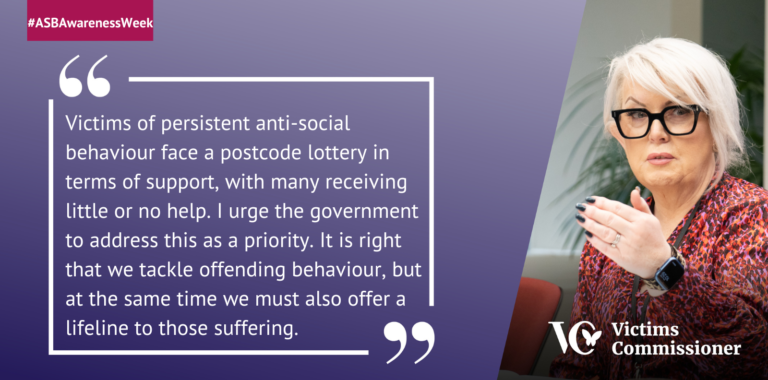Questions raised over effectiveness of Respect Orders and ‘hotspot’ policing in tackling persistent anti-social behaviour

The Victims' Commissioner has welcomed the announcement of new measures to tackle anti-social behaviour in public spaces but questioned how these will address the persistent and targeted anti-social behaviour that typically occurs in residential communities.
The Home Secretary has unveiled Respect Orders, new measures which the Home Office says will see repeat perpetrators of anti-social behaviour subject to tough restrictions on their behaviour.
These new powers will allow police and local councils to ban persistent offenders from town centres or prohibit them from drinking in public areas, such as high streets and parks.
Respect Orders will initially be piloted before being rolled out nationwide.
In addition to restrictions, offenders could also be required to address the root causes of their behaviour. This may involve mandatory participation in rehabilitation programs, such as drug or alcohol treatment or anger management courses. Failure to comply with a Respect Order will constitute a criminal offence, giving police the authority to arrest anyone breaching the conditions immediately.
Responding to the announcement, Baroness Newlove welcomed the move, but called for “a more nuanced approach”, one that balances tackling offending behaviour with providing support to victims of targeted and persistent anti-social behaviour in their communities. She stressed the need to ensure that “to ensure no victim is left behind.”
She highlighted that existing policing measures like ‘hotspot policing,’ which typically focus on public spaces such as town centres, “do little to support victims in residential areas.”
Communities affected by persistent anti-social behaviour, particularly those where victims experience targeted campaigns of harassment in their homes, are often neglected by such policing initiatives.
Respect Orders seem to be similarly targeted at offending behaviour in town centres and public areas.
“While tackling public nuisances like graffiti and street drinking is important,” she writes. “We must also confront the persistent forms of anti-social behaviour that plague victims in their homes.”
“These individuals often endure targeted and persistent campaigns of harassment, yet the harm they suffer is frequently underestimated by police and other agencies.”
Baroness Newlove emphasises that the planned Respect Orders pilot will be key in determining whether these measures provide “a more effective solution” than current tools to address this type of offending.
The Victims’ Commissioner for England and Wales, Baroness Newlove, said:
“I welcome the government’s continued commitment to tackling anti-social behaviour, as demonstrated in today’s announcement of Respect Orders. I support any initiative aimed at tackling anti-social behaviour, though I urge the government to adopt a more nuanced approach to ensure no victim is left behind.
“Tackling public nuisances like graffiti and street drinking is important. We must also confront the persistent forms of anti-social behaviour that plague victims in their homes. These individuals often endure targeted and persistent campaigns of harassment, yet the harm they suffer is frequently underestimated by police and other agencies. Hotspot policing, focused on town centres, does little to support victims in residential areas. This pilot will be crucial in determining whether Respect Orders provide a more effective solution.
“Victims of persistent anti-social behaviour face a postcode lottery in terms of support, with many receiving little or no help. I urge the government to address this as a priority. It is right that we tackle offending behaviour, but at the same time we must also offer a lifeline to those suffering.”
Baroness Newlove has been consistent in her calls for improved recognition and support for victims of persistent anti-social behaviour.
Baroness Newlove has long called for better recognition and support for victims of persistent anti-social behaviour. She has stressed that it should not be seen as a “low-level” nuisance, as its cumulative impact can devastate victims’ lives. She advocates for victims of persistent anti-social behaviour to be granted the same rights and support as victims of other crimes, including referral to victim support services once the threshold for an ASB Case Review is met.
Further reading
It pains me that, 17 years after Garry’s death, I still meet victims of persistent anti-social behaviour who are having the same experiences we had.
Published on November 18, 2024
Read full articlePublished on September 6, 2024
Download the reportBaroness Newlove’s report found people’s lives have been ‘severely impacted’ because of the failure of forces to act on complaints.
Published on September 9, 2024
Read the blog